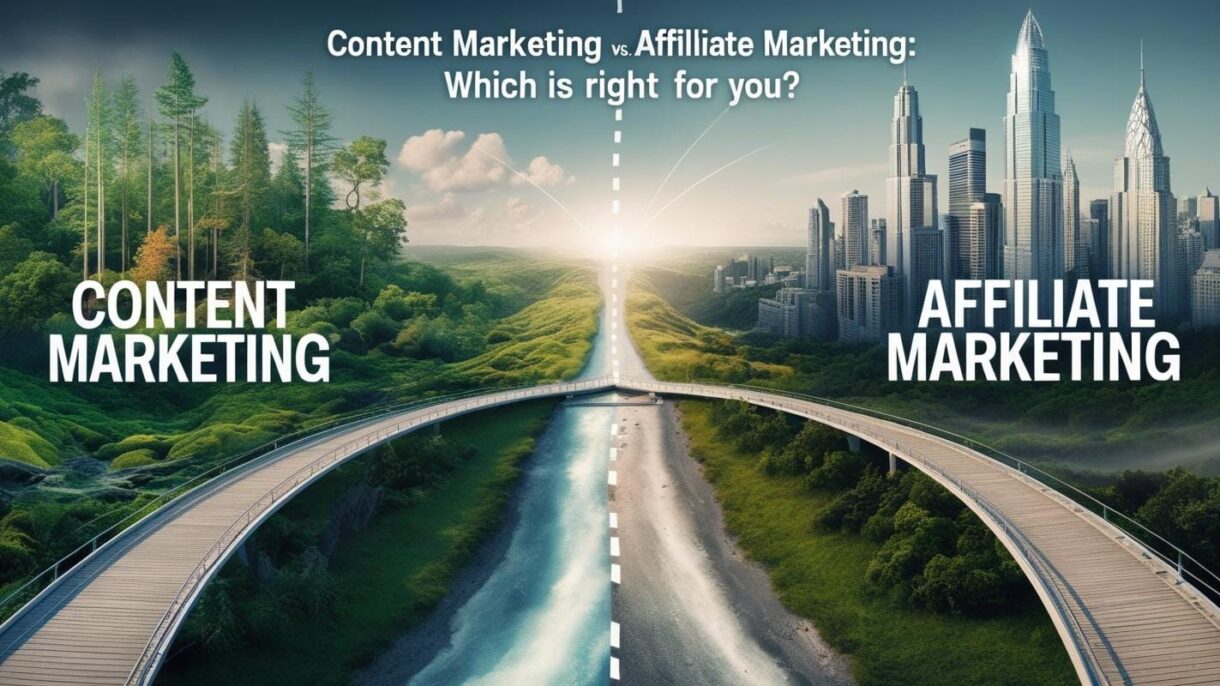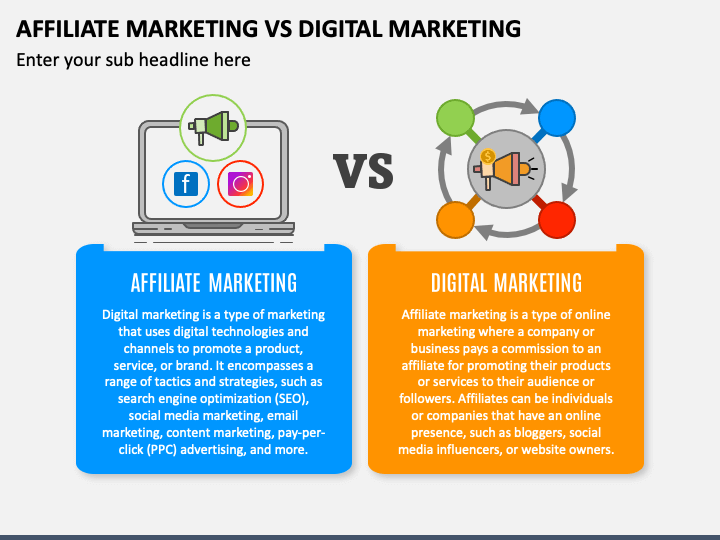
In today’s rapidly evolving digital landscape, Indian businesses face a myriad of choices when it comes to marketing strategies. The dilemma often revolves around selecting the most effective approach to reach and engage their target audience. Two prominent strategies that have gained significant traction are content marketing and affiliate marketing. Each offers unique advantages, but determining which is right for your business requires a deep understanding of their nuances, especially within the Indian context.
Table of Contents
Sr. Headings
1.Introduction: Navigating the Digital Maze
2.The Pitfalls of Solely Relying on Performance Marketing
3.Decoding Content Marketing: Building Trust Through Value
4.Unpacking Affiliate Marketing: Monetizing Influence
5.The Power of Influencer Marketing in India
6.The Rise of Growth Marketing: A Holistic Approach
7.OCP Academy: Shaping Digital Marketers for 2025
8.Case Study: Park+ – A Content Marketing Triumph
9.Case Study: Dell India – Affiliate Marketing Success
10.Integrating Strategies: The Full-Stack Digital Marketing Approach
11.Measuring Success: KPIs and Metrics
12.Challenges and Solutions in the Indian Market
13.Future Trends in Digital Marketing
14.Choosing the Right Path: Content vs. Affiliate Marketing
15.Conclusion: Empowering Your Digital Journey
16.FAQs

The Pitfalls of Solely Relying on Performance Marketing
Performance marketing, encompassing tactics like Google Ads and Facebook Ads, has been a go-to for many businesses aiming for quick results. While these platforms offer immediate visibility and measurable outcomes, they come with inherent challenges. The cost-per-click (CPC) rates have been escalating, leading to increased customer acquisition costs. Moreover, the moment you pause your ad spend, the traffic and leads often dwindle, making it a less sustainable long-term strategy.
In the Indian market, where price sensitivity is high, and competition is fierce, relying solely on performance marketing can strain budgets without guaranteeing customer loyalty. Additionally, ad fatigue can set in, where audiences become desensitized to repetitive ads, reducing their effectiveness over time.
Decoding Content Marketing: Building Trust Through Value
Content marketing revolves around creating and distributing valuable, relevant content to attract and retain a clearly defined audience. In India, where consumers are increasingly seeking information before making purchasing decisions, content marketing has emerged as a powerful tool.
By offering insightful blog posts, engaging videos, and informative infographics, businesses can position themselves as industry leaders. This strategy not only drives organic traffic through search engine optimization (SEO) but also fosters trust and credibility among potential customers. Over time, this trust translates into brand loyalty and higher conversion rates.
Unpacking Affiliate Marketing: Monetizing Influence
Affiliate marketing involves partnering with individuals or entities (affiliates) who promote your products or services in exchange for a commission on sales generated through their efforts. In the Indian context, this strategy has seen exponential growth, especially with the rise of influencers and content creators.
Platforms like Amazon and Flipkart have robust affiliate programs, allowing bloggers, YouTubers, and social media influencers to monetize their content by recommending products to their followers. This approach leverages the trust and rapport affiliates have with their audience, leading to higher conversion rates. However, it’s essential to ensure that affiliates align with your brand values to maintain authenticity.
The Power of Influencer Marketing in India
Influencer marketing has become a cornerstone of digital strategies in India. With a diverse population and varying regional preferences, influencers bridge the gap between brands and consumers by offering relatable content in local languages and contexts.
Brands collaborate with influencers to tap into niche markets, leveraging their established trust and engagement levels. This strategy is particularly effective in tier-two and tier-three cities, where traditional advertising may not resonate as strongly. By aligning with influencers who embody their brand values, companies can achieve deeper market penetration and foster genuine connections with their target audience.

The Rise of Growth Marketing: A Holistic Approach
While performance, content, and affiliate marketing each play a crucial role, growth marketing is the strategy that ties them all together. It’s not just about acquiring users—it’s about retaining them, delighting them, and turning them into brand advocates. In the Indian context, where digital consumption is soaring, and attention spans are shrinking, growth marketing becomes essential for sustained success.
Growth marketing blends data, creativity, and experimentation to optimize the entire customer journey. It leverages SEO, email marketing, A/B testing, social media, and personalized content to improve engagement and retention. Instead of investing heavily in short-term ad campaigns, Indian businesses using growth marketing focus on building a strong funnel—awareness, consideration, and loyalty.
Think of it like gardening. Instead of buying flowers every day (like with paid ads), you plant seeds, water them, and nurture them over time. The results may take longer, but they’re deeper and longer-lasting. For example, a startup in Mumbai selling organic skincare products could use content to educate customers, influencer marketing to build credibility, and email nurturing to convert leads—creating a full-cycle marketing system that runs like clockwork.
OCP Academy: Shaping Digital Marketers for 2025
As India marches into the digital age, the demand for skilled marketers who understand both traditional and modern strategies is surging. This is where institutions like OCP Academy come into play. Positioned as one of the leading digital marketing training centers in India, OCP Academy is preparing the next generation of marketers with hands-on, industry-relevant training.
With modules covering SEO, content strategy, affiliate marketing, performance analytics, influencer collaboration, and more, the academy ensures learners aren’t just trained—they’re empowered. What sets OCP apart is its focus on practical application. Students don’t just learn theories; they work on real campaigns, tackle live projects, and gain certifications that boost employability.
Imagine a young professional from Lucknow joining OCP Academy. In six months, they transition from a novice to a confident strategist capable of running 360-degree marketing campaigns for any Indian brand. In an era where business growth hinges on digital skills, OCP Academy serves as a bridge between ambition and achievement.
Case Study: Park+ – A Content Marketing Triumph
Let’s take the example of Park+, a fast-growing Indian startup that provides smart parking solutions. Instead of pouring their entire budget into ads, Park+ focused on content marketing to educate people about urban mobility issues and their innovative solutions.
They created blog posts that addressed common problems—like “Top 5 Ways to Avoid Parking Fines in Delhi” or “How Smart Parking Saves Time in Mumbai Traffic.” Their content wasn’t salesy; it was helpful, engaging, and SEO-optimized. They also released videos demonstrating their app’s features and how it solves real-world issues.
The result? Park+ saw a 3x increase in organic traffic in under six months. More importantly, people started recognizing them as thought leaders in urban mobility. They built a community, not just a customer base.
This case study highlights the immense potential content marketing holds in India—especially for startups looking to scale without burning through their budgets. By being consistent, strategic, and customer-focused, brands like Park+ prove that value-driven content can be the real game-changer.
Case Study: Dell India – Affiliate Marketing Success
On the affiliate marketing front, Dell India offers a shining example of how global brands can localize their strategy for Indian consumers. Dell launched a robust affiliate program where tech bloggers, review sites, and influencers could earn commissions by recommending Dell products.
Instead of traditional ads, Dell India leveraged partnerships with trusted tech creators on YouTube and Instagram. These creators unboxed laptops, demonstrated features, and shared honest reviews. Each video or blog post included unique affiliate links that tracked sales back to the content creator.
One such affiliate, a popular YouTuber from Pune, helped Dell drive significant traffic and conversions during the festive Diwali season. His relatable tech advice, mixed with personal anecdotes and regional humor, made the content resonate deeply with viewers.
Dell’s affiliate strategy led to a notable spike in e-commerce sales, especially in tier-two cities, proving that when executed authentically, affiliate marketing can deliver excellent ROI—even for high-ticket products.
Integrating Strategies: The Full-Stack Digital Marketing Approach
Now imagine combining all these powerful tactics into one seamless strategy. That’s what we call a full-stack digital marketing approach. In 2025, especially in India’s vibrant market, a siloed strategy no longer cuts it. To truly grow and thrive, brands must weave content, affiliate, influencer, and performance marketing into one unified plan.
This means using content marketing to educate and attract, affiliate marketing to drive sales through trusted voices, influencer marketing to build authenticity, and performance marketing to scale reach. But the magic lies in syncing them through a growth marketing mindset—constantly testing, tweaking, and improving based on data and feedback.
For instance, a fashion brand in Bangalore might create style guides (content), work with Instagram influencers, offer affiliate commissions to bloggers, and run retargeting ads on Facebook. Together, these tactics create a flywheel effect—driving traffic, nurturing leads, and boosting conversions without over-relying on any single channel.
When done right, full-stack marketing isn’t just effective—it’s unstoppable.
Measuring Success: KPIs and Metrics
Marketing without measurement is like driving blindfolded. To understand what’s working and what’s not, businesses need to track key performance indicators (KPIs) across all channels. In India’s dynamic digital space, having a pulse on your numbers is critical to scaling intelligently.
For content marketing, KPIs might include organic traffic, average session duration, bounce rate, keyword rankings, and content shares. If your blog about “budget smartphones under ₹15,000” is bringing in 10,000 readers a month, you know you’ve hit a nerve. More importantly, you can see how many of those readers become customers or subscribers.
Affiliate marketing success, on the other hand, is all about clicks, conversion rates, and commissions. Are your affiliates driving high-quality traffic? Are those users making purchases? Tracking through unique links and dashboards helps you fine-tune the program.
Growth marketers in India are increasingly using analytics tools like Google Analytics, Hotjar, HubSpot, and even WhatsApp Business to measure engagement. And when influencer marketing is in play, metrics like reach, engagement rate, comments, and direct messages tell you whether people are resonating with the story.
Success isn’t always viral. Sometimes, it’s a steady climb—more like a marathon than a sprint.
Challenges and Solutions in the Indian Market
India’s digital economy is one of the most vibrant in the world, but it’s not without its unique set of challenges. Language diversity, internet connectivity issues in rural areas, trust gaps in online transactions, and regional behavior patterns can all influence the effectiveness of a marketing strategy.
For content marketers, writing in Hindi, Tamil, Bengali, and other regional languages can exponentially increase reach. But it’s not just about translation—it’s about localization. What resonates with a millennial in Chennai may not click with a college student in Kanpur. Tailoring messages to suit cultural and emotional tones is crucial.
Affiliate marketers often face issues with fraud or low-quality traffic. To combat this, brands are moving towards influencer-affiliate hybrids—trusted personalities who don’t just sell but educate and influence. Platforms like OCP Academy are also introducing modules that train affiliates in ethical, high-converting practices tailored to the Indian audience.
Also, digital literacy is a growing focus. As more Indians come online for the first time, there’s a huge opportunity to create educational marketing content. Think tutorials, explainers, or even reels that simplify complex products. Brands that step up as educators win trust—and market share.
Future Trends in Digital Marketing
The next five years are going to be transformative for India’s digital marketing scene. Artificial intelligence (AI) will drive smarter targeting. Voice search will grow rapidly, especially in regional languages. Micro-influencers will rule, especially in hyperlocal niches like vegan skincare in Kerala or tech gadgets in Nagpur.
Content will continue to be king—but context will be emperor. Video will dominate, particularly on mobile-first platforms like Instagram Reels, YouTube Shorts, and WhatsApp Channels. Personalization powered by data will ensure that users don’t just see ads—they feel like the brand is talking directly to them.
Affiliate marketing will evolve beyond links to full-blown partnerships. Imagine an affiliate who’s also your product tester, brand ambassador, and content creator—this hybrid model will thrive.
Institutes like OCP Academy are already adapting their curriculum to include these future skills. Brands that stay agile and embrace these changes will set themselves apart in an increasingly crowded market.
Choosing the Right Path: Content vs. Affiliate Marketing
So, which one is right for you—content marketing or affiliate marketing? The answer lies in your business goals, resources, and audience. If you’re looking to build long-term trust, rank on Google, and become a thought leader, content marketing is your best bet. It takes time, but the rewards compound.
If you need faster results and want to tap into existing audiences through collaborations, affiliate marketing is the way to go. It’s performance-based, cost-effective, and works wonders if you partner with the right affiliates.
But here’s the real secret: you don’t have to choose one over the other. The smartest Indian brands in 2025 are blending both. Content sets the stage, affiliate drives conversions, and together, they create a brand that is both visible and valuable.
It’s like cricket—you need both batsmen and bowlers to win the match. Alone, each has power. Together, they create magic.


Yes, but it takes time, consistency, and strategy. Organic growth is slower but builds long-term value.
Absolutely, but they must be part of a larger funnel. Without a proper landing page or content support, ads alone won’t convert.
It’s a combination of all digital skills: content creation, paid ads, SEO, analytics, email, social, influencer, and more. It gives you a holistic view of marketing.
Enroll in practical, hands-on programs like those at OCP Academy. Choose mentors who’ve worked in the field, not just taught theory.
Yes! Even small brands can collaborate with micro-influencers who have high engagement and local trust.
Conclusion
Digital marketing in India is no longer just an option—it’s a necessity. Whether you're a solopreneur in Jaipur, a startup in Hyderabad, or a legacy brand in Mumbai, the path to growth lies in smart, integrated marketing. Content marketing builds your foundation; affiliate marketing brings in revenue; influencer strategies humanize your brand; and growth marketing ties it all together. Tools and tactics will evolve, but the heart of marketing—connecting with people—remains unchanged. So don’t be afraid to experiment. Don’t be afraid to fail. Learn from every campaign, tweak your approach, and keep moving forward. Whether you choose content, affiliate, or a mix of both, what matters most is that you start. Because the digital world rewards action-takers. You’ve got the tools. You’ve got the audience. Now it’s your time to shine.
OCP Academy
(A Unit of OCP Foundation)
Learning Today, Leading Tomorrow

